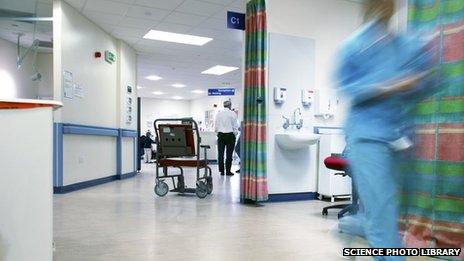Survey of cancer patients: 89% say treatment excellent or very good
- Published

The survey of cancer patients aims to drive up standards across Wales
A major survey of cancer patients in Wales suggests the vast majority thought their care was excellent or very good.
But the study of over 7,000 patients found there were variations between hospitals and some cancer types.
Those with rarer conditions, and lung cancer, were less likely to be positive than those with common cancers.
Macmillan Cancer Support said the figures were "fantastic" but showed areas where improvements were needed.
This included patients needing to be offered more support when their treatment had ended.
The Cancer Patient Experience Survey, a partnership of the Welsh government and Macmillan Cancer Support, is the first such study to be carried out in Wales.
It aims to improve standards for cancer services across the country.
Macmillan Cancer Support in Wales general manager Susan Morris said: "It is fantastic that 89% of the cancer patients who completed the survey said their care was either excellent or very good.
"The survey also highlights areas where improvements are needed including variations between local health boards and the experiences of people with different cancer types.
"It is clear from the survey that health boards have some way to go in fully meeting people's needs, for example, patients need to be offered more support when their treatment has ended, which is increasingly important as more people are living with or beyond cancer."
The most positive scores at hospital level were at Velindre in Cardiff, Llandough in the Vale of Glamorgan, and Ysbyty Gwynedd in Bangor, Gwynedd.
Swansea's Singleton and Morriston hospitals, Glangwili in Carmarthenshire, and the Royal Glamorgan in Rhondda Cynon Taf were least positive.
Care plan
Singleton Hospital in Swansea had the lowest overall score compared to the Welsh average.
It failed to score significantly higher than the average in any one of the survey's 85 questions, and scored significantly lower in 34.
Abertawe Bro Morgannwg Health Board, which runs Singleton and Morriston hospitals, said the survey was an important reminder that there was more to cancer treatment than surgery, radiotherapy and chemotherapy.
Bronwen Davies said she was shocked to be diagnosed with cancer
"We welcome the results of the survey, which clearly demonstrate there is room for improvement in providing information and support for cancer patients, particularly those who are admitted to hospital," said the health board.
"We recognise this is an important issue and have been working hard to improve this aspect of our service."
In the survey generally, a number of the poorer scores given by patients were related to information given to them about key aspects of their condition, treatment and care.
Results suggested two-thirds of patients were not receiving written information about their cancer, and 78% were not being provided with a written care plan to help them manage their illness.
These are both commitments made in the Welsh government's cancer delivery plan.
Health minister Mark Drakeford said it was 'fantastic' to be told cancer care was excellent
Half of respondents were not given information by hospital staff about how to get financial help or benefits they may have been entitled to.
A third of patients were not given the name and contact details of a key worker, whose role is to provide continuity of care and support, offer referral to psychological services if required and liaise with other healthcare professionals.
The survey suggested 30% of patients were not told they could bring a friend or family member along with them to get their diagnosis.
But Health Minister Mark Drakeford said he was pleased with the overall results.
"I am heartened to see so many patients had a positive experience, and the evidence of effective systems being in place alongside support to individuals is very clear," he said.
"The NHS as a whole will need to listen to and act upon the voices of patients."
- Published18 December 2013
- Published23 October 2013
- Published17 October 2013
- Published29 May 2013
- Published13 October 2013
- Published30 September 2013
- Published26 August 2013
- Published12 June 2013